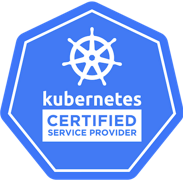
Hands-on Kubernetes Course
Unlock the full potential of running your applications on Kubernetes
Our three-day Kubernetes course helps software developers get in-depth knowledge about using Kubernetes for deploying applications in a reliable and cost-effective manner.
In the theoretical sessions, we will explain the basics of the technology and discuss the core components of Kubernetes and how they interact with each other. We will also look at best practices for getting high availability and resilience in your applications, both by making sure the underlying container image is optimised as well as the Kubernetes resources.
In the practical sessions, you will learn to work with Kubernetes on a live demo cluster. The workshop covers all core features of Kubernetes orchestration, including managing, deploying, scaling and updating container applications and will show you how to debug any issues that come up in every day usage. At the end of the course, you will have the knowledge and skills to use Kubernetes with confidence.